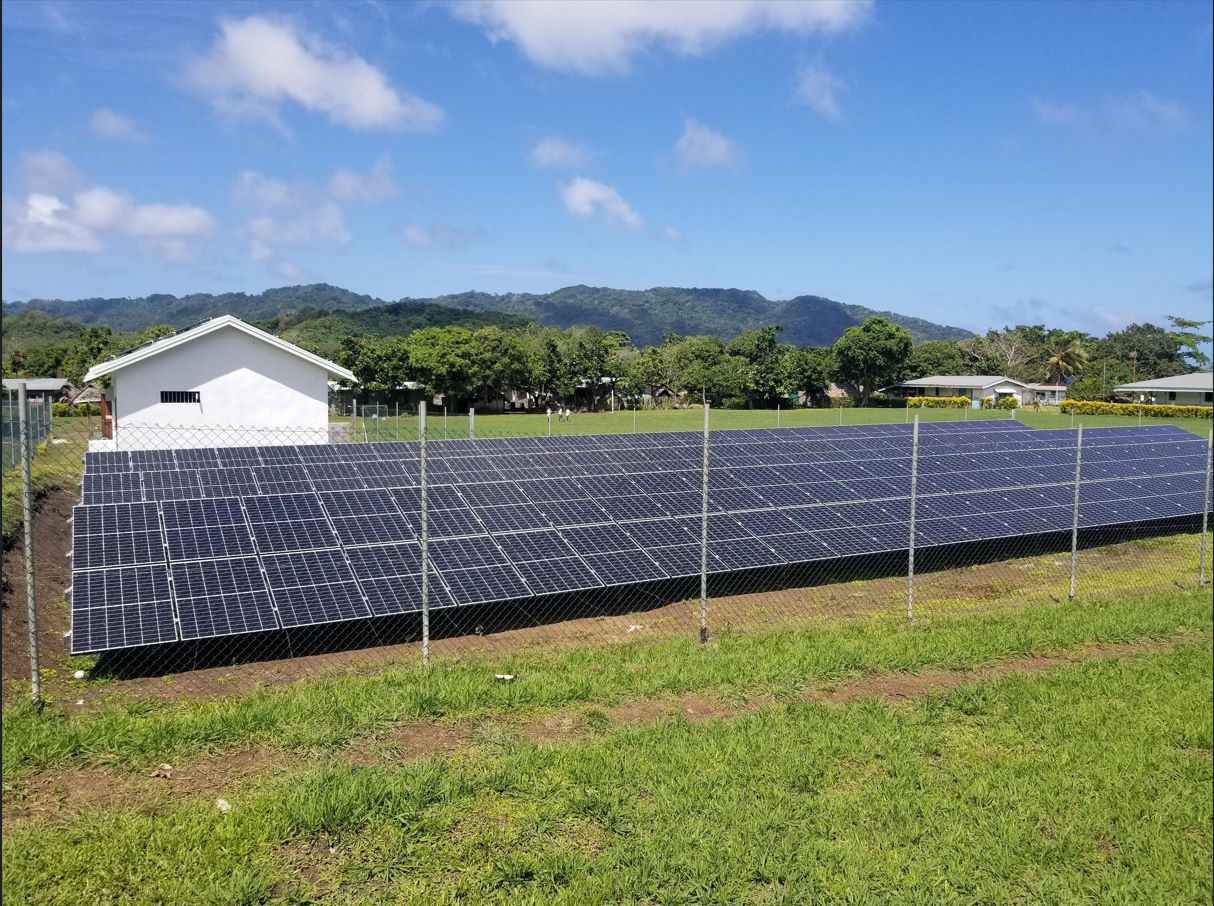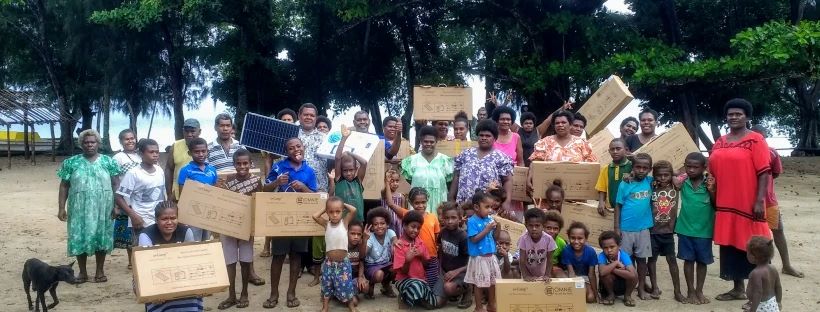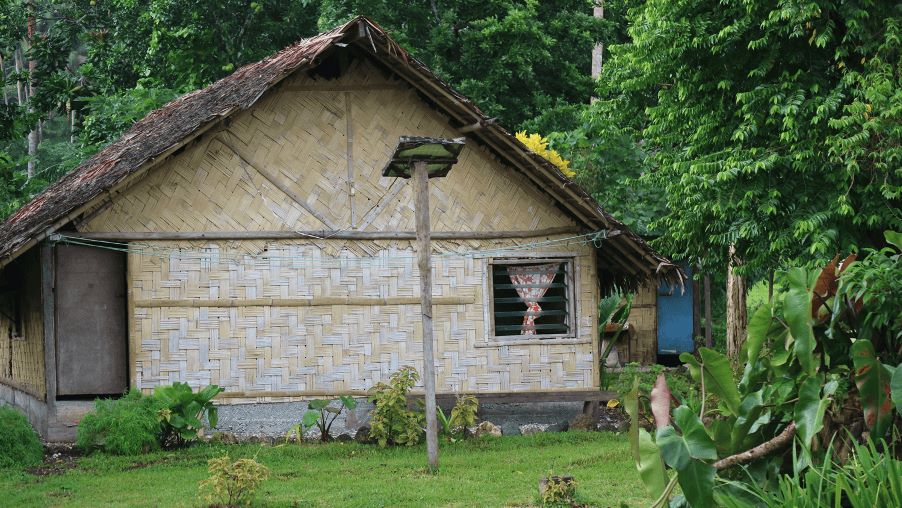A swift transition to renewable energy sources on Islands must be balanced with environmental safeguards and community rights. Such energy injustices are evident globally, as the pressure to fight climate change and to shield from volatile oil and gas markets increases, many countries may favour renewable energy deployment at the expense of nature and local communities. Such an imbalance is evident in the 2022 European regulation considering renewable projects as of “Overriding public interest” ...
Islands, Nature & Renewable Energy Law Project (INRELP)
Working closely with island climate change and energy stakeholders, the IUCN World Commission on Environmental Law Climate Change Law Specialist Group Islands, Nature & Renewable Energy Law Project (INRELP) developed policy recommendations with the goal of enhancing renewable energy, preserving nature, and engaging local island communities.
 Wintua/Lorlow Solar PV Mini Grid Project
Wintua/Lorlow Solar PV Mini Grid Project
BACKGROUND
Despite their minimum contribution to climate change and being among the most vulnerable to its impacts, islands around the world are putting forward bold climate change targets demonstrating leadership and ambition when it comes to tackling climate change. From Vanuatu in the South Pacific, to the Dominican Republic in the Caribbean, to Scottish Islands in Europe, islands are becoming beacons of innovation and equitable approaches in the global drive towards a greener, decarbonised, and fairer society and economy.
The IRENA SIDS lighthouse initiative, amongst others, has shined the light on island-led decarbonisation efforts globally, some of which now have some of the most ambitious renewable energy targets in the world. However, in some cases, such ambition can be frustrated by a lack of solid legal frameworks and regulatory capability to attract sufficient and sustainable investment in renewables to islands. In Europe, the Clean Energy for EU Islands secretariat has identified a number of such regulatory barriers to the decarbonisation of EU islands. Such type of mapping, comparative and support initiative is missing for islands in other regions.
POLICY BRIEFS & DELIVERABLES
- Island case studies exploring renewable energy potential (D01);
- A brief mapping the current energy and electricity production legal and regulatory framework of case study islands (D02);
- A brief highlighting an island’s key regulatory barriers to the increased penetration of renewables, while preserving nature and involving communities (D03); and
- A brief comparing and contrasting good practices and challenges on the islands covered in the project leading to policy recommendations aimed at overcoming such regulatory barriers within a specific island (D04)
D01, D02 and D03 focuses on a given island. D04 focuses on a wider set of islands enabling the project to draw out policy recommendations aimed at overcoming the identified regulatory barriers.
ISLANDS IN THE PROJECT
 Vanuatu Rural Electrification Project
Vanuatu Rural Electrification Project
The project has started focusing on the island nation of Vanuatu.
- Vanuatu’s renewable energy potential (2023);
- Vanuatu’s current energy and electricity production legal and regulatory framework (2023);
- Vanuatu’s key regulatory barriers to the increased penetration of renewables, while preserving nature and involving communities (2023); and
- Policy recommendations aimed at overcoming key regulatory barriers within Vanuatu (2023)
We are keen to collaborate with other islands (both sovereign island nations and subnational island jurisdictions). If you are a climate change and energy stakeholder on an island, and wish to discuss a possible collaboration, please send us an email.
Events
The project will be presented at a number of events at COP 28.
Islands Driving Forward Climate Change Law, 10 December, 17:30 – 18:30 (Local Time) at the IUCN Pavilion, Ground-floor, Thematic building 4 (TA4.135), Blue Zone, Al Wasl Avenue - Dubai - United Arab Emirates – Organizers: IUCN WCEL CCLSG
Event Flyer
More details here
TEAM
The project is led by three IUCN WCEL Climate Change Law Specialist Group members.
Francesco Sindico is the IUCN WCEL Climate Change Law Specialist Group Co-Chair. He is the Scottish Government Carbon Neutral Islands Lead on secondment from the University of Strathclyde. There he is a Professor in International Environmental Law. He is the founder of the Strathclyde Centre for Environmental Law and Governance (SCELG) and leader of the EILEAN initiative where he researches about law, islands and sustainability). Francesco is also the Founder and Co-Director of the Climate Change Legal Initiative (C2LI). He has also worked extensively on international water law, and he was Counsel for the Plurinational State of Bolivia in the Dispute over the Status and Use of the Waters of the Silala (Chile v. Bolivia) before the International Court of Justice (ICJ). He is also Counsel for IUCN in the ICJ Advisory Opinion on State’s climate change obligations.
Dr Madeline Taylor, Macquarie University. Madeline Taylor is Director of Research Training and Senior Lecturer at Macquarie Law School, Deputy Director of the Centre for Energy and Natural Resources Innovation and Transformation (CENRIT), Co-Stream Lead of Transforming Energy Markets Research Centre, and Honorary Associate at the Sydney Environment Institute. Madeline specialises in issues at the intersection of socio-legal aspects of energy and natural resources law, as well as property and commercial law. Her research advances the novel examination of transitioning energy regulation and energy policy from comparative and socio-legal perspectives including embedding justice into the energy transition and the intersections between energy regulation and regional communities. She is a Board Member of RE Alliance and is a contributing author to the Lexis Nexis flagship energy law practitioner text Energy and Resources Law.
Dr Romain Mauger, Iberian Centre for Research in Energy Storage (CIIAE). Romain Mauger is Head of Legal Research Unit at the CIIAE, Spain. A lawyer by training, he also worked as a wind farm developer in France for more than 3 years, before undertaking his PhD. Romain participated to large European and international projects, including the Horizon SMart IsLand Energy systems (SMILE) project, where he assessed the legal framework applying to the deployment of smart grid solutions on EU islands. Romain’s research experience focuses on energy law for the transition to renewable energy sources with two main angles. 1) Studying the applicable legal framework for fast-evolving energy technologies (e.g., batteries, microgrids, electric vehicles charging points) and their end-uses in order to propose regulatory improvements. It entails a strong appetite for interdisciplinary research. 2) Using and improving the Law to ensure a fairer energy system. Romain’s work on energy justice, just transition and more recently degrowth is testimony to that.
The project benefits from the contribution of 12 active members of the IUCN WCEL Climate Change Law Specialist Group. The Vanuatu policy briefs have been produced by master students at the University of Groningen as part of their internships in the LLM Energy & Climate Law. They drafted the policy briefs under the guidance and supervision of Francesco, Madeline, and Romain.
Funding
 Vanuatu Rural Electrification Project
Vanuatu Rural Electrification Project
The project has so far relied on in kind support from the institutions linked to the three key project team members. Moving forward we are actively looking to secure funding to step up our research and to work more closely with island climate change and energy related stakeholders. If you are interested in a potential collaboration, please send us an email.
